FORT HOOD, Texas -- Units preparing to deploy to Southwest Asia from Fort Hood, Texas, can draw training equipment from the 407th Army Field Support Brigade's 4th Battalion. This program is called PDTE or Pre-deployment Training Equipment.
The "Mighty" 407th AFSB is part of the Army Sustainment Command headquartered at Rock Island, Ill.
PDTE is part of the Army Force Generation process, also known as ARFORGEN - a cycle of training, deploying, and bringing Soldiers back from the field.
The importance of PDTE cannot be overstated. Without it, units would not be able to train on the equipment - such as up-armored tactical wheeled vehicles -- they would be using when deployed, resulting in valuable time lost in theater. PDTE ensures that the training phase of ARFORGEN brings each unit up to speed quickly and effectively.
This loan process is intended to augment unit shortages while ensuring maximum utility of limited resources. It is not designed to satisfy all unit requirements, 407th personnel said.
Deploying units must identify their needs to the G-3 Training Mission Support Element at III Corps at least 60 days before the unit needs the equipment. Upon approval, a unit representative is contacted to arrange for an issue date.
"I think communications between us and the unit is very important," said Donald Ford, PDTE supply technician. "If the unit will come down here, with a POC a week before or two weeks before the draw, sit down with us, talk to us, see what they have to do, bring their supply sergeants down here, do a walk- through with us, I think it will go a lot smoother."
Issue and turn-in of PDTE is normally held on Mondays, Ford said.
The two-day issuing process involves both unit personnel and the PDTE custodian conducting an inventory and checking all equipment to ensure it is up to standard.
Just having the thousands of pieces of equipment on hand is an enormous mission, but the equipment for PDTE can get some pretty harsh treatment during training cycles. Hence, it's vital that it gets proper and regular maintenance, gets repaired when needed, and that each piece of equipment is accounted for.
"If you find a problem with one of your trucks, I have two guys, plus I'll be out there. All you have to do is come to us and let us know," Ford said. "There is a possibility that you could find something wrong. We'll look at it. If we can fix it, we'll fix it. If we can't fix it, we'll swap that truck out."
Policy dictates the unit rep signing for the equipment must be a rank of sergeant or higher, have a DA 1687 signature card authorizing him to sign for and turn in equipment, and have a copy of orders from the unit commander.
After the unit is done training, all the equipment - including basic issue items or BII, and components of end-items - will be re-inspected and must be turned back in the same condition, if not better, than when it was issued.
"We are drawing fully mission capable vehicles to include BII. Accountability of BII is very important, not only during the issuing, but also during the turn-in," said Capt. Gary Quach, a PDTE recipient from the 1st Cavalry Division. "BII for the vehicles helps maintain the vehicles on a regular basis at the unit level."
Equipment that is lost, damaged or destroyed - other than fair wear and tear - must be rectified by the training unit in order to clear its hand receipt, 407th personnel said.
A PMCS - preventive maintenance checks & services -- will also be performed when the equipment is brought back in. If it's damaged when returned, repairs can be handled one of two ways: the unit can repair it themselves, or it can authorize paying for the equipment to be repaired.
If any piece is lost, the unit must pay for it.
"You know if it's received as fully mission capable, it should be turned in at 10-20. If it's issued at 10-20, it should come back in a better state of 10-20. So the next individuals that can borrow it, right, can get the benefit of the use. This is taking care of equipment; that's taking care of your buddy," said Col. Danny Tilzey, 407th AFSB commander.
These safeguards are needed because another unit will be using the equipment for training sometime in the near future, Tilzey said, and each unit will be held responsible for how it treats the equipment it's issued.
Units are asked to observe a few rules:
0 The POC signing for equipment must be present with all required documentation
0 Be responsible for all maintenance and services during the loan period
0 Don't make any vehicle changes such as bumper number and windshield markings
0 Don't remove radio mounts, antennas or handsets
0 Vehicles must be clean and topped off with fuel at turn-in
0 And finally, all vehicles and equipment accessories will be jointly re-inspected
The 407th AFSB commander is also concerned about safety.
"Another area that concerns me is when I see young Soldiers trying to drive a piece of equipment away that they're not licensed on. It's not on their 348 -- never been trained on it," Tilzey said.
"You know someone said to them 'Go forth, and take that piece of equipment and bring that home.' That's unsafe. Let's not ever have an accident or an injury involving someone trying to do the right thing, but who isn't qualified," Tilzey said.
Units deploying depend on PDTE to properly train-up to ensure success in theater. And thanks to the "Mighty" 407th AFSB's 4th Battalion at Fort Hood, units are getting the help they need to accomplish their mission.
(Editor's note: Parts of this article were written by Greg Wilson, VISTA International Operations technical writer, ASC Public Affairs)
-30-
For queries, contact the Army Sustainment Command Public Affairs Office at rock-amsas-pa@conus.army.mil or by phone at 309-782-5421.
For current ASC news, go to www.aschq.army.mil.
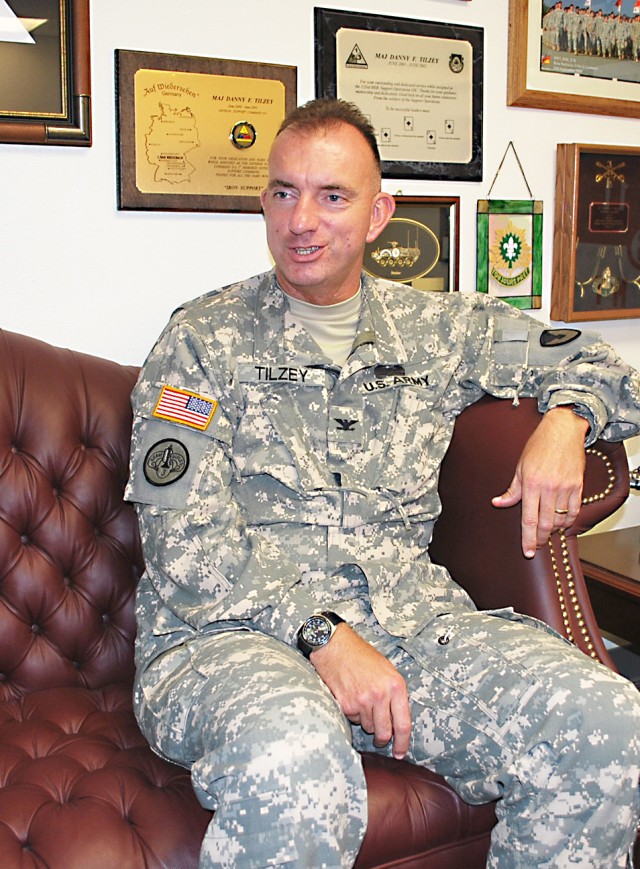
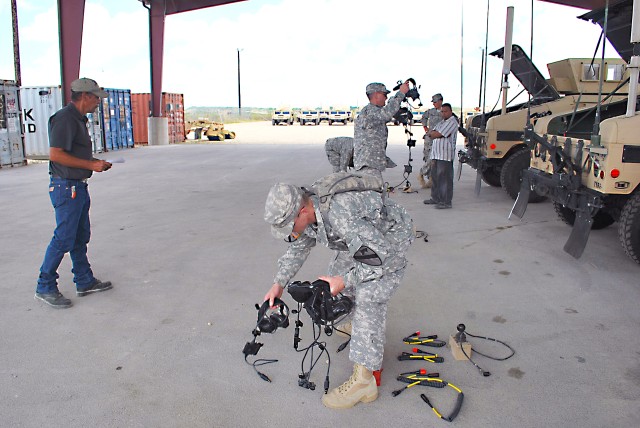
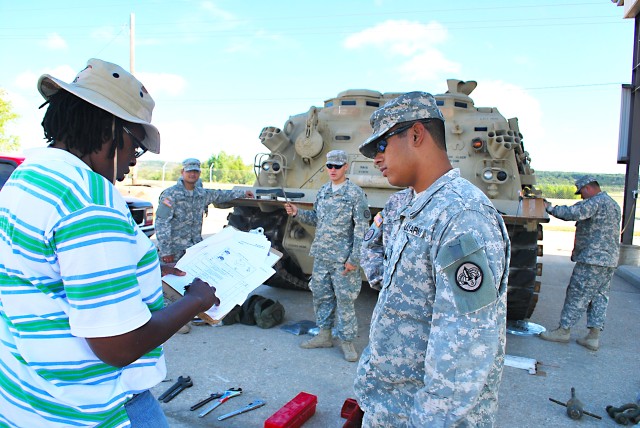
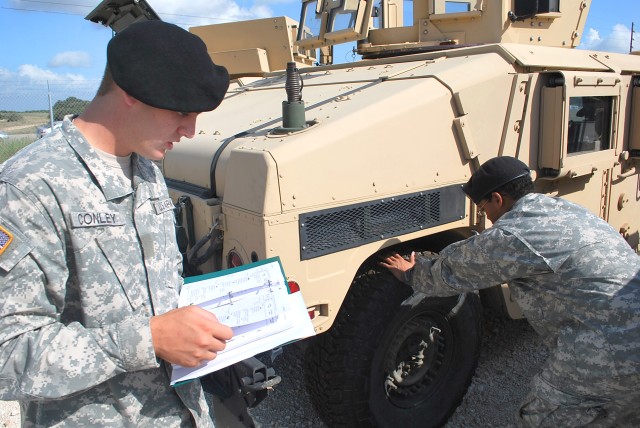
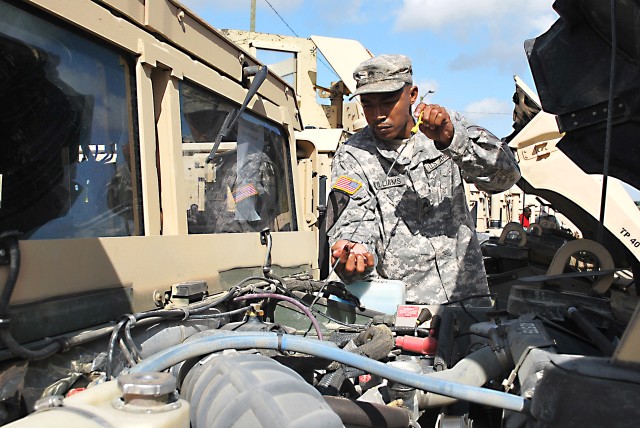





Social Sharing